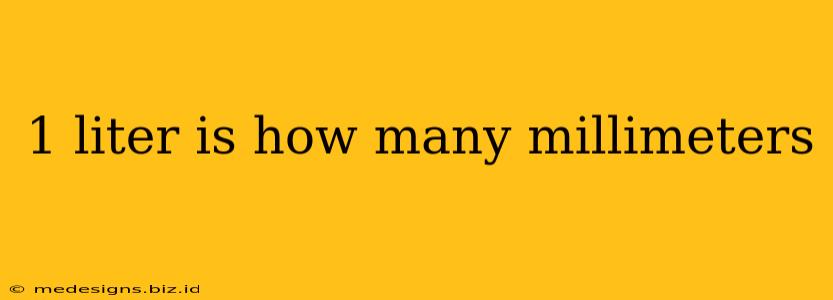1 Liter is How Many Milliliters? A Simple Conversion
Are you confused about the relationship between liters and milliliters? Don't worry, it's a common question! This quick guide will explain how to easily convert liters to milliliters and vice versa. Understanding this conversion is crucial in various fields, from cooking and baking to science and engineering.
Understanding Liters and Milliliters
Both liters (L) and milliliters (mL) are units of volume in the metric system. The key difference lies in their scale:
- Liter (L): A base unit of volume. Think of it as a standard unit for measuring liquids.
- Milliliter (mL): A smaller unit of volume. "Milli" means one-thousandth, so one milliliter is one-thousandth of a liter.
The Conversion: 1 Liter to Milliliters
The conversion is straightforward:
1 liter (L) = 1000 milliliters (mL)
This means that one liter is equal to one thousand milliliters. Therefore, if you have 1 liter of water, you have 1000 milliliters of water.
Practical Examples
Let's look at some practical examples to solidify your understanding:
- Recipe Conversion: If a recipe calls for 250 mL of milk, that's equivalent to 0.25 L of milk (250 mL / 1000 mL/L = 0.25 L).
- Medical Dosage: If a medication requires 5 mL of liquid, it's the same as 0.005 L (5 mL / 1000 mL/L = 0.005 L).
- Scientific Experiments: In a laboratory setting, accurately measuring volumes in milliliters is often necessary for precise results. Converting between liters and milliliters is essential for accurate calculations and data analysis.
Converting Milliliters to Liters
To convert milliliters to liters, simply divide the number of milliliters by 1000.
For example:
- 5000 mL = 5000 mL / 1000 mL/L = 5 L
Key Takeaway
Remembering that 1 L = 1000 mL is the key to effortlessly converting between these two common units of volume. This knowledge will help you confidently tackle various situations requiring volume measurements. Whether you're in the kitchen, the lab, or anywhere else, understanding this conversion is invaluable!
